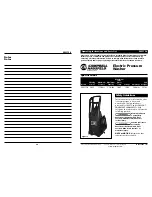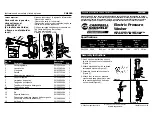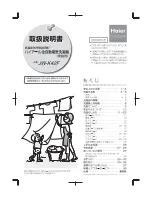
17
MAINTENANCE
WARNING:
When servicing, use only identical replacement parts.
Use of any other parts may create a hazard or cause
product damage.
WARNING:
Always wear safety goggles or safety glasses with side
shields during power tool operation or when blowing
dust. If operation is dusty, also wear a dust mask.
WARNING:
Before inspecting, cleaning or servicing the machine, shut
off engine, wait for all moving parts to stop, and discon-
nect spark plug wire and move it away from spark plug.
Failure to follow these instructions can result in serious
personal injury or property damage.
GENERAL MAINTENANCE
Avoid using solvents when cleaning plastic parts. Most
plastics are susceptible to damage from various types of
commercial solvents and may be damaged by their use. Use
clean cloths to remove dirt, dust, oil, grease, etc.
WARNING:
Do not at any time let brake fluids, gasoline, petroleum-
based products, penetrating oils, etc., come in contact
with plastic parts. Chemicals can damage, weaken or
destroy plastic which may result in serious personal
injury.
Only the parts shown on the parts list are intended to be
repaired or replaced by the customer. All other parts should
be replaced at an authorized service center.
Before running the engine, perform the following pre-
operation steps:
Check that all bolts, nuts, etc., are securely tightened.
Make sure the air filter is clean.
Check both the engine lubricant level and the fuel tank
level; refill as needed.
Inspect the work area for hazards.
If there is excessive noise or vibration, stop the unit
immediately.
NOZZLE MAINTENANCE
See Figure 19.
Excessive pump pressure (a pulsing sensation felt while
squeezing the trigger) may be the result of a clogged or
dirty nozzle.
Turn off the pressure washer and shut off the water
supply. Pull trigger to release water pressure.
Remove the nozzle from the spray wand.
NOTE: Never point the spray wand at your face.
Using the nozzle cleaning tool provided, free any foreign
materials clogging or restricting the nozzle.
Using a garden hose, flush debris out of nozzle by back
flushing (running the water through the nozzle backwards
or from the outside to the inside).
Reconnect the nozzle to the spray wand.
Turn on the water supply and start the engine.
Fig. 19
NozzLE
CLEANING TooL
NozzLE
Summary of Contents for HU80722
Page 20: ...20 NOTES NOTES ...






































